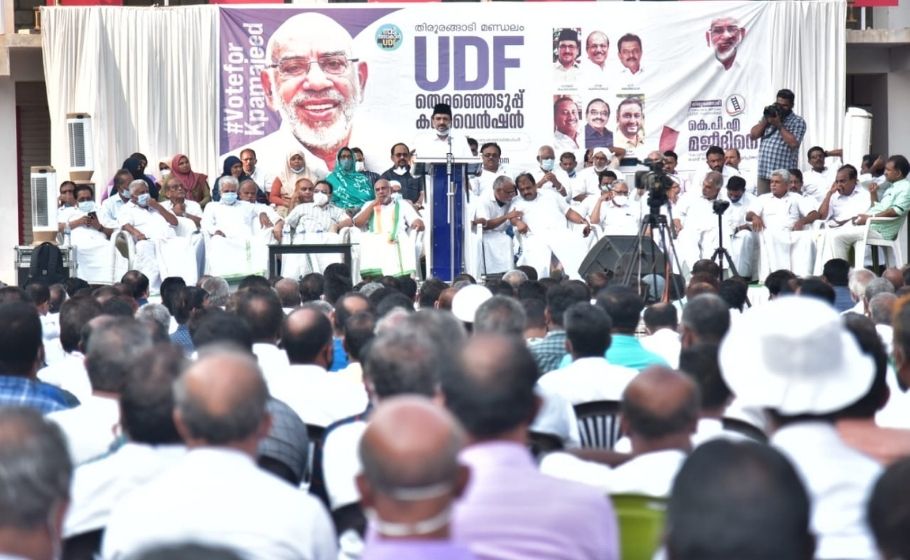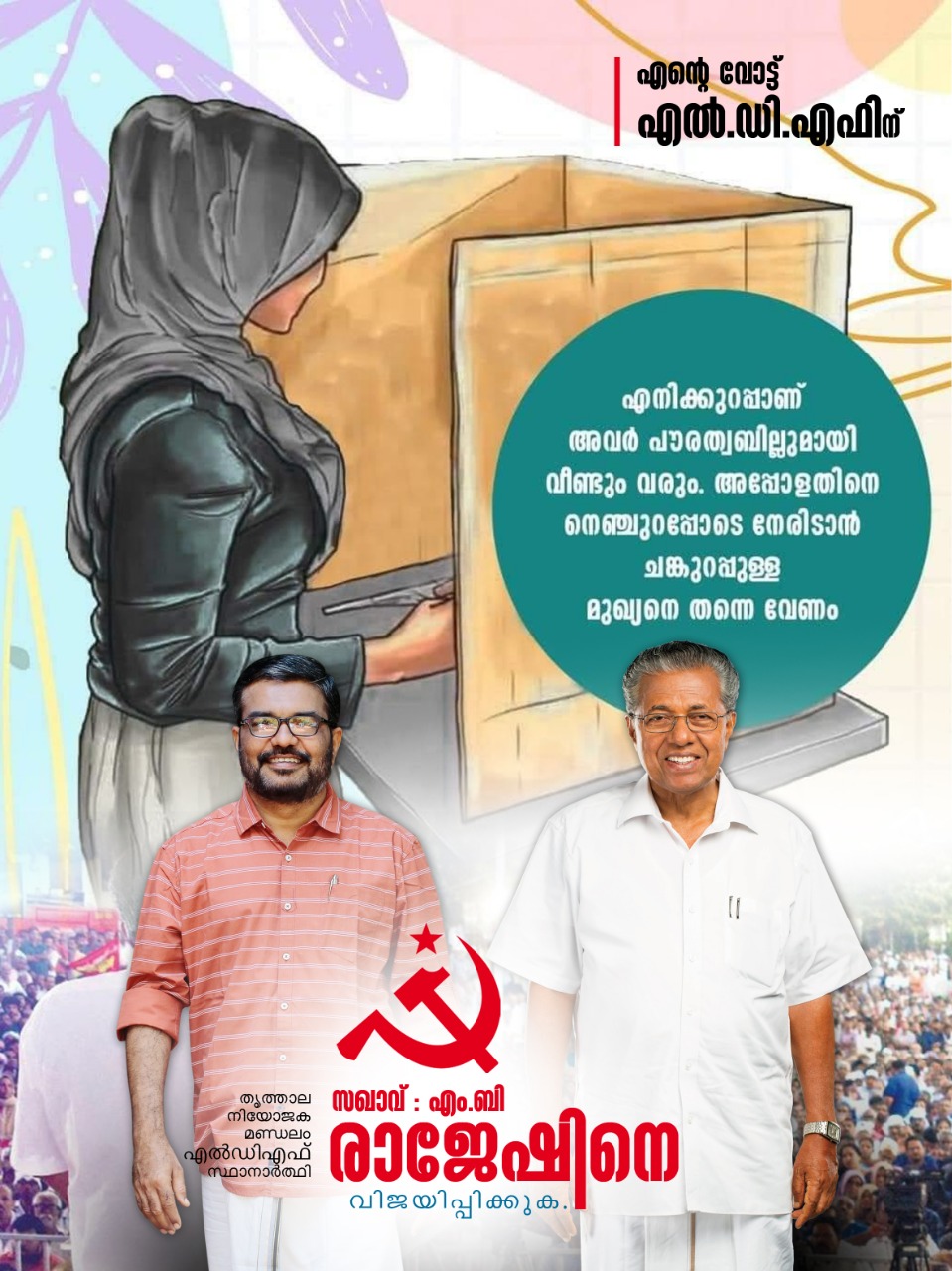
Anti-CAA stance helps Left make inroads in north Kerala's minority areas
The introduction of the Citizen Amendment Act [CAA] and the political parties’ responses to it has created cracks and divisions in Muslim organisations, which may cause a significant shift in the voting pattern this time in favour of the LDF.

The ruling Left Democratic Front (LDF) in Kerala is finding support from some unexpected pockets in one of the northern Kerala districts that has voted for the constituents of the Opposition United Democratic Front (UDF) in the past. This, perhaps, is the only discernible change from the last assembly election, as the LDF’s support base in the other districts in north Kerala seems to be intact.
Malappuram, the only district in Kerala where Muslims constitute a majority, has been a UDF bastion, thanks to the presence of the Muslim League, which has 12 of the 16 assembly segments in the district, with the LDF holding the remaining four. The Muslim League enjoys dominance in the district mostly with the support of the dominant faction of the Samastha Kerala Jamiyyathul Ulama, Kerala’s largest body of Sunni scholars. But some young faces and new leaders of the faction do not like to be identified as the vote bank of the League.
“Our organisation has its own identity. We don’t prefer to be known as the B team of any political party. The Samastha is a body of scholars; it is a spiritual organisation and does not actively involve in politics,” says Sathar Panthaloor, general secretary of Samastha Kerala Sunni Students Federation (SKSSF), the students wing of the Ulema.
The LDF’s opposition to the Citizen Amendment Act (CAA) has also been winning it support from some sections of the Muslim community. The SKSSF is backing chief minister Pinarayi Vijayan as he had raised his voice against the CAA. The CAA had rattled Muslims in Kerala and only the Left parties took an uncompromising stand against it, says Ali Rahman of SKSSF.
The Samastha Kerala Jamiyyathul Ulama — and by extension the SKSSF — has traditionally voted for the the Muslim League, whose dominance in the Malabar region has helped the UDF’s cause in elections. The introduction of the CAA and the political parties’ response to it had created cracks among Muslim organisations, making some of them shift loyalties to the LDF in the 2020 local body elections.
Related news | Christian-dominated central Kerala, a UDF bastion, may favour the Left again
The Samastha is split into two — the EK faction and the AP faction. The division was caused in 1989 by differences between two leaders, late E K Aboobacker Musaliar and AP Aboobacker Musaliar. The EK Sunni faction has the backing of a majority Muslims in the Malabar region and it has traditionally supported the Muslim League, which is a part of the UDF. The splinter faction, under the leadership of AP Kanthapuram Aboobacker Musaliar, has been been with the LDF.

An UDF convention in Thirurangadi constituency in Malappuram | Photo: By special arrangement“I have been a Congress supporter, but, this time, I will vote for Pinarayi Vijayan. The CAA will come again and only he’ll resist it,” says Jabir Mohammed, who runs a roadside tea shop in Ponnani, Malappuram.
Jabir, however, does not represent the general mood of the minority in the district. Those who have traditionally supported the League still have doubts about the secular nature of the Left.
“The CPM’s state secretary constantly makes anti-Muslim statements. It seems that the LDF is trying to woo Hindu voters by bashing the Muslims,” Abdul Rahman, a loyalist of the EK Sunni faction running a travel agency in Kozhikode, says. He was referring to the recent verbal attacks launched by CPI(M) state secretary A Vijayaraghavan against the Muslim League and his controversial statement that minority communalism is more dangerous than the majority one. (He later corrected himself and said it was a slip of tongue).
The LDF has a comfortable majority in other northern Kerala districts like Kasargod, Kannur and Kozhikode. The UDF has only two of 13 seats in Kozhikode and three of the 11 in Kannur, from where the chief minister hails. In Kasargod, where the BJP has a tangible presence, the LDF holds three and the UDF two of the total five constituencies. The BJP finished second in the Mancheswaram and Kasaragod seats of the district in the 2016 election.
The northern region of Kerala also has some fringe groups like the Social Democratic Party of India (SDPI) and the Welfare Party (the political outfit of Jamaath-e-Islami), that claim to represent the interests of the Muslim community. They, however, have very little vote share — in 2016, SDPI and Welfare party together managed to win only 0.3 per cent of the total votes polled.
The Left, especially the CPI(M), is openly hostile to the Jamaath-e-Islami, often referring to it as the Muslim counterpart of RSS. The CPI(M) believes that Jamaath’s open alliance with the UDF played a role in its crushing defeat in the 2019 Lok Sabha election, even though the organisation is thin in terms of members and followers. However, the social media wings of the Welfare Party and Jamaath-e-Islami have a visible presence and play the role of opinion makers.
Related news | As polls near, war of words between Kerala govt, central agencies escalates
“About 99 per cent of Muslims in Kerala go either with the UDF or LDF. The fringe groups who claim to be voicing the rights of Muslims have not the community’s trust,” says Mustafa Mundupara, leader of SKSSF and the CEO of Suprabhatham daily, the mouthpiece of Samastha [EK faction].
The SDPI, which once used to be the foot soldier of the League, has had conflicts with both the LDF and the UDF.
Related news | Moment of reckoning: Polls will not be a cakewalk like before for Muslim League
“Besides the decaying of the League, the followers of the party have been influenced by the protest raised by the CPI(M) against the CAA. This will be reflected in the election,” says Adv Rafeek, an SDPI loyalist in Mancheswaram, Kasaragod. This, however, is not the position of the party.
Ashraf, a local SDPI leader in the Thruthala constituency in Palakkad district, does not conceal his displeasure with both the fronts. “The Congress has not even taken a position on CAA. The CPI(M) opposed it, but we are sceptical of its sincerity,” he said.

A poster of LDF candidate MB Rajesh contesting from Thruthala constituency in Palakkad district | Photo: By special arrangementA journey through the heartlands of Malabar makes one thing clear: the Communist Party, perceived to be a ‘party of non-believers’, is no longer as ‘untouchable’ as it was in the past. In fact, posters of hijab-wearing women declaring support for the LDF is a common sight.
“The government has performed well; it has paid attention to the core needs of people and has handled crises such as natural disasters and epidemics well,” says O Abdul Rahman, an ideologue of Jamaath-e Islami and the group editor of its media offerings — Madhyamam daily and Media One Television. The possibility of the continuation of LDF rule is high, he says.
“There are a lot of practising Muslims who are active comrades. We are only against extremism and communalism, not against one’s right to faith. Only the Left stands for the religious and political rights of the minorities,” says state higher education Minister KT Jaleel, who’s contesting from Thavanur in Malappuram.
All Muslim leaders in northern Kerala districts are steadfast about one one thing — their unanimous resolution is that they will cast the vote against the BJP, especially where the saffron party has a significant presence. The Sunni factions, the Jamaath-e Islami and the SDPI have decided to support candidates — be it of LDF or UDF — with a chance to win in constituencies where the BJP is a potential threat.

